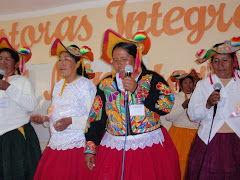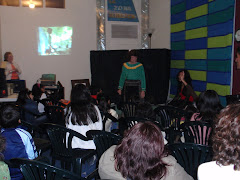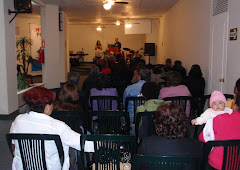Wednesday, March 26, 2008
How Long Will We Stay?
Traveling from church to church over many months we are often asked about the future of El Oasis de Esperanza, our middle/upper class church plant in Lima. Part of the inquiry includes the desire to know how long we will be pastoring the church. This is a difficult question to answer, especially when there are so many aspects to address.First we are very committed to indigenous church principles in our missionary endeavors. We want to see El Oasis as a Peruvian church in every aspect; self-governing, self-financing, self-duplicating, self-expressing, self-theologizing, etc. Obviously then, the future of El Oasis will include a Peruvian pastor. All missionaries should plant churches with an exit strategy. Still it is difficult to predict a timetable for our departure. We are committed to seeing this church flurish and make an impact on the Peruvian culture. We are committed to seeing this church be strong enough to begin planting other churches among this strata of society. When this assignment is complete, we will gladly step aside.Second God continues to surprise us as we move forward with this project. This is because He is leading the way. We have a general idea of where He is going, but we have rediscovered that our role in all of this is to be faithful and obedient. The Lord must win the lost and build the church. And He certainly does this His way and not ours. At this point we sense that the Lord is going to move us to a place where 500 people can gather together. This is why we have initiated with a formal building project. There is coming a day when El Oasis will have 3 full services. From this strength other churches will be planted. We want to release enough people and finances so that the new church can function on its own.Two more great needs lay before us. Our part of Lima has 5 university campuses. As far as we know, there are no evangelical ministries on any of them. These represent thousands of students who are at a very critical moment in their lives. They are searching for truth. We must take advantage of this window of opportunity. The other need is spiritual renewal among already existing churches. The Peruvian Pentecostal movement is now in its 3rd and 4th generations. The passage of time has some how "watered down" the experience and fervor of the first converts who responded to message of Pentecost. It is time to see another generation embrace the power of the Holy Spirit. It would be presumptous to assume that God would even use El Oasis to help lead the way in this renewal. All we can do is continue to seek Him and know Him better, responding in faith when He speaks. And yet, the within the depths of our own spirits we feel that the Lord is starting to respond to these 2 needs.
Saturday, March 15, 2008
Feudal Society & Ministry to the Middle/Upper Class
For more than 12 years now we have been attempting to educate our listners and supporters on the need for reaching the middle/upper class in Latin America. This is no small task since American society is structured very different from society south of the Rio Grande.
In the United States it is still possible to realize the "American dream." With dedication, hard work and a little luck, people who come from extreme poverty have opportunities to move up the "social ladder." Their success can be defined in terms of wealth, power and influence. A poor lad from a broken home in Hope, Arkansas can still become President of the United States. While most citizens are dissatisfied with the national economy and their spending power as individuals, there is a still a common feeling that most of us are in the same boat since the bulk of the population (80%) identifies with the middle class. 15% would be in the lower class and 5% would be in the upper class.
The situation in Latin America is very different. Society breaks down into the same 3 classes, but the distribution of wealth is very different. In Peru it is closer to 5% upper class, 15% middle class and 80% lower class. This, of course, makes the majority class dependent on the minority class. The government, willing or unwilling, becomes the focal point of unfilled expectations by those in poverty because it is at the top of the social pyramid. Even more difficult to understand is the huge gap that exists between the classes. The gulf between the lower and middle classes is so wide that few can cross it even with educational and cultural "upgrades." The same is true between the middle and upper classes, though the distance is smaller. The passage from poverty to riches in Latin America is the "impossible dream."
In many ways this is similar to the feudal system that dominated society during the Middle Ages. 1000 years ago serfs were the poverty class. The lords were the upper class. The middle class lived in villages. The serfs were servants who worked the land and built the castles and the villages all owned by the lords. The "village people" were shopkeepers, merchants and artisans. Changing your station in life was nearly impossible. You stayed where you were born. Serfs lived to serve. The "village people" were helpers. The beneficiares were the lords. However, in times of emergency all of society looked to the lords for help. The majority had no means of coping with wars, famine or disease.
This understanding is very important for sharing the gospel in Latin America. Some of the first Assemblies of God missionaries arrived in Peru 90 years ago. They started their work among the lower class because in was the largest group of people present and it was also the neediest. During the remainder of the 20th century the church grew, sometimes very rapidly. Today Lima, for example, has nearly 500 Assemblies of God churches and extention points. And yet, all but 2 of these churches are geographically located in the lower class areas of the city. Why? It is very difficult for "serfs" to share the gospel with "lords." The "serfs" may have the desire to share and even the know how to share with the "lords," but they can't change who they are. "Lords" don't listen to "serfs." While the huge protests that take on main plaza of Lima do gain the attention of those who are in power, they do little, if anything, to bring change. Even history teaches us that the numerous revolutions that come and gone throughout Latin America have done very little to help make society a better place to live for the majority population.
We believe God has called us to share the gospel with the middle/upper class of Lima, Peru for several reasons:
1. God loves them and wants them to be a part of His kingdom.
2. As foreigners we have more in common with this group, than their
own lower class who have been unable to reach them with the
gospel. We have a hearing and an opportunity with them.
3. Lives that are truly transformed by the Holy Spirit will change what
they do. People with power and influence can make an impact on
society and reduce the inequality and suffering.
Jesus was a revolutionary, but He focused on transforming hearts first. We want to be a part of a spiritual revolution in Peru that will change society. One way this can happen is for us to share the love of Christ with the influencers of this beautiful country.
In the United States it is still possible to realize the "American dream." With dedication, hard work and a little luck, people who come from extreme poverty have opportunities to move up the "social ladder." Their success can be defined in terms of wealth, power and influence. A poor lad from a broken home in Hope, Arkansas can still become President of the United States. While most citizens are dissatisfied with the national economy and their spending power as individuals, there is a still a common feeling that most of us are in the same boat since the bulk of the population (80%) identifies with the middle class. 15% would be in the lower class and 5% would be in the upper class.
The situation in Latin America is very different. Society breaks down into the same 3 classes, but the distribution of wealth is very different. In Peru it is closer to 5% upper class, 15% middle class and 80% lower class. This, of course, makes the majority class dependent on the minority class. The government, willing or unwilling, becomes the focal point of unfilled expectations by those in poverty because it is at the top of the social pyramid. Even more difficult to understand is the huge gap that exists between the classes. The gulf between the lower and middle classes is so wide that few can cross it even with educational and cultural "upgrades." The same is true between the middle and upper classes, though the distance is smaller. The passage from poverty to riches in Latin America is the "impossible dream."
In many ways this is similar to the feudal system that dominated society during the Middle Ages. 1000 years ago serfs were the poverty class. The lords were the upper class. The middle class lived in villages. The serfs were servants who worked the land and built the castles and the villages all owned by the lords. The "village people" were shopkeepers, merchants and artisans. Changing your station in life was nearly impossible. You stayed where you were born. Serfs lived to serve. The "village people" were helpers. The beneficiares were the lords. However, in times of emergency all of society looked to the lords for help. The majority had no means of coping with wars, famine or disease.
This understanding is very important for sharing the gospel in Latin America. Some of the first Assemblies of God missionaries arrived in Peru 90 years ago. They started their work among the lower class because in was the largest group of people present and it was also the neediest. During the remainder of the 20th century the church grew, sometimes very rapidly. Today Lima, for example, has nearly 500 Assemblies of God churches and extention points. And yet, all but 2 of these churches are geographically located in the lower class areas of the city. Why? It is very difficult for "serfs" to share the gospel with "lords." The "serfs" may have the desire to share and even the know how to share with the "lords," but they can't change who they are. "Lords" don't listen to "serfs." While the huge protests that take on main plaza of Lima do gain the attention of those who are in power, they do little, if anything, to bring change. Even history teaches us that the numerous revolutions that come and gone throughout Latin America have done very little to help make society a better place to live for the majority population.
We believe God has called us to share the gospel with the middle/upper class of Lima, Peru for several reasons:
1. God loves them and wants them to be a part of His kingdom.
2. As foreigners we have more in common with this group, than their
own lower class who have been unable to reach them with the
gospel. We have a hearing and an opportunity with them.
3. Lives that are truly transformed by the Holy Spirit will change what
they do. People with power and influence can make an impact on
society and reduce the inequality and suffering.
Jesus was a revolutionary, but He focused on transforming hearts first. We want to be a part of a spiritual revolution in Peru that will change society. One way this can happen is for us to share the love of Christ with the influencers of this beautiful country.
Subscribe to:
Comments (Atom)









































